If you’re planning to trade gold in Sri Lanka, you should be aware of several scams that could potentially cost you dearly. Counterfeit gold, for instance, is a widespread issue where real gold is mimicked by inferior metals, cleverly disguised to escape a layman’s scrutiny. Moreover, you might encounter bait-and-switch tactics, where the deal initially presented isn’t the one you end up with. Understanding these scams can be the difference between making a secure investment and suffering a significant loss. Recognizing the signs of these fraudulent practices is crucial, but what are the more subtle indicators you should watch out for?
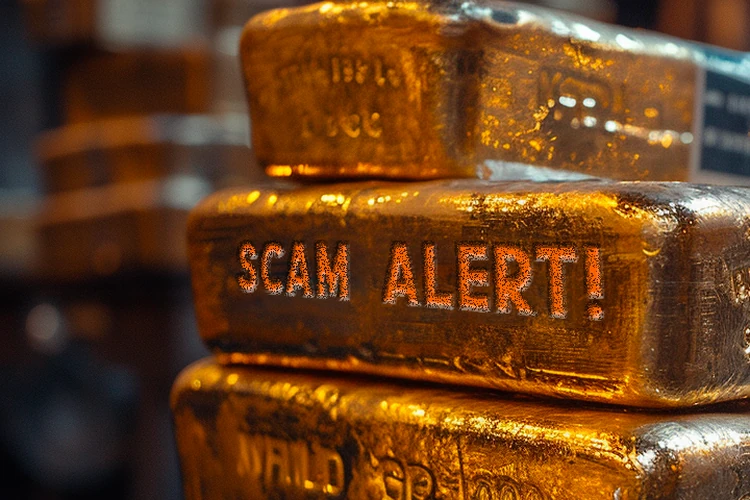
Recognizing Counterfeit Gold
To protect yourself from falling prey to counterfeit gold scams, it’s crucial to recognize the signs of fake gold products. You’ll often encounter items that look identical to genuine gold but are actually composed of inferior metals with a thin gold plating. The appearance alone can be deceiving, so don’t rely solely on how shiny or heavy an item feels.
When you’re considering a purchase, always deal with reputable dealers and jewelers. These professionals are less likely to sell counterfeit items and more likely to provide certification for their goods. If you’re unsure about a piece’s authenticity, don’t hesitate to ask for professional testing. Methods like acid tests, electronic testers, or X-ray fluorescence scans can reveal the true composition of the metal.
Also, be mindful of the hallmark and the engravings on the jewelry. Genuine gold products are typically stamped with marks that indicate their purity, such as ’10K,’ ’14K,’ or ’18K.’ If these marks are missing, or if the item has inconsistent or poorly engraved markings, it’s a red flag. Remember, if a deal seems too good to be true, it probably is. Always verify before you buy.
Risks in Bait-and-Switch Scams
Bait-and-switch scams pose significant risks, as you might end up purchasing counterfeit gold despite initial appearances of authenticity. This deceptive tactic can occur in various settings including jewelry stores, pawnshops, or during private transactions. Initially, a seller may showcase genuine gold to gain your trust, but they subtly switch it with a fake item when you’re not paying close attention.
To guard against this, you need to be vigilant throughout the entire buying process. Make sure the item you inspected initially remains the same one you end up purchasing. It’s a good idea to mark or mentally note any unique characteristics of the item when first viewing it.
Furthermore, consider having a trusted expert accompany you during high-value transactions. This expert can verify the authenticity of the gold on the spot and ensure that no switch occurs before the deal is finalized. You should also deal only with reputable dealers and jewelers who’ve verified credentials and positive reviews.
Staying alert and informed can help you avoid falling victim to these bait-and-switch scams, protecting your investment and ensuring you get the genuine article you’re paying for.
Understanding Weight Fraud
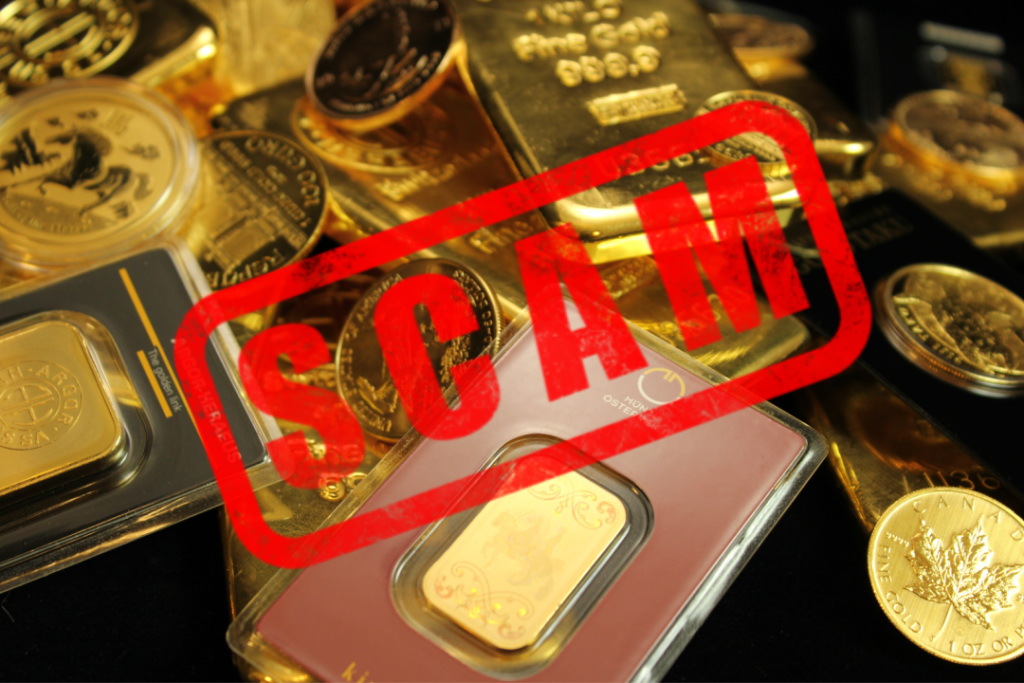
In weight fraud, scammers tamper with scales to show less gold weight than is actually present, costing you money. This deceit directly impacts how much you’re paid, with the scales often subtly calibrated to understate the weight of your gold. It’s a common trick in less reputable shops or informal buying setups where regulation and oversight are lax.
To protect yourself, always verify the accuracy of scales. Don’t hesitate to ask for a calibration check before your gold is weighed. This is your right as a consumer. You can even bring your own digital scale to compare readings. More often than not, shops that are up to no good will back down when they see you’re cautious.
Additionally, consider having your gold weighed by multiple vendors. If there’s a consistent discrepancy in the weights reported, it’s a clear sign of tampering. This might seem like a hassle, but it’s a powerful deterrent against fraud.
Lastly, engage only with established dealers who adhere to strict standards. These businesses value their reputation and are less likely to engage in such fraudulent practices. Building a relationship with trustworthy dealers can provide you with peace of mind in your future transactions.
Dealing With Lowball Offers
While protecting yourself from weight fraud is important, you also need to be wary of receiving lowball offers when selling your gold. Some buyers, particularly in less reputable markets or pawnshops, may attempt to purchase your gold for much less than its actual value. It’s crucial you’re aware of the current market prices for gold.
Before you sell, take the time to educate yourself about the gold rates on that day. Prices can fluctuate, so knowing the current value ensures you’re not caught off guard by a low offer. Don’t hesitate to get quotes from multiple buyers. This not only gives you a clearer idea of your gold’s worth but also provides leverage in negotiations.
Be cautious of buyers who pressure you into making quick decisions. They’re often hoping you’ll accept a poor offer to avoid the hassle of shopping around. Remember, reputable buyers should give you time to consider their offer without pressure.
Lastly, always trust your instincts. If an offer seems too low, it probably is. Don’t be afraid to walk away from a deal that doesn’t feel right. Selling your gold should be beneficial for you, so don’t settle for less than what it’s worth.
Identifying Fake Appraisals
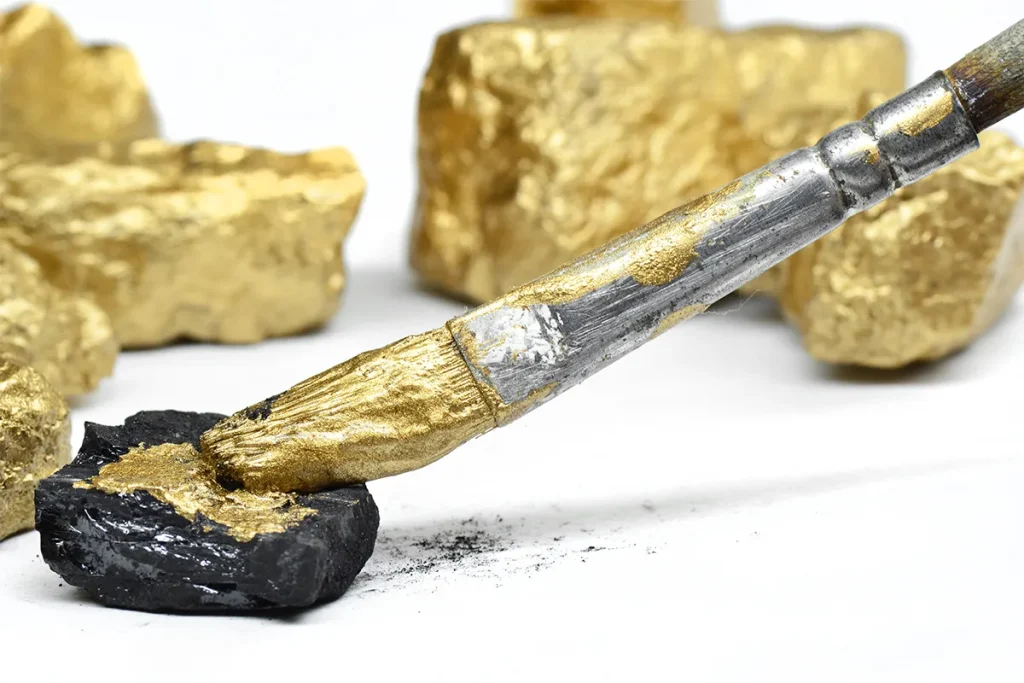
You should always verify the credentials of an appraiser to avoid falling victim to fake appraisals. Don’t just trust someone because they claim to be an expert. It’s essential to check whether they’re accredited by reputable organizations. Fake appraisers often undervalue your gold intentionally, causing you a significant financial loss.
Don’t hesitate to ask for a detailed report on your gold item. A legitimate appraiser will provide a comprehensive analysis that includes weight, purity, and market value. If the appraiser hesitates or refuses to give detailed documentation, that’s a red flag. You’re better off finding someone else who’s more transparent.
Educate yourself about the typical characteristics and market value of your gold before getting it appraised. This knowledge will arm you against scammers who might attempt to deceive you with false information. Remember, knowledge is power.
Lastly, always cross-verify the appraisal. You can do this by seeking a second opinion from another trusted appraiser. If the evaluations differ significantly, it could indicate that one of the appraisals might be fraudulent. Being cautious and informed can save you from these common gold scams.
Choosing Reputable Dealers
Selecting reputable dealers is crucial when buying or selling gold to ensure you’re involved in a fair and legitimate transaction. You’ll want to start by researching local and online dealers with a strong presence and positive reviews. Look for dealers who are members of recognized industry associations; these memberships often require adhering to strict ethical standards.
Don’t hesitate to ask for references or testimonials from previous customers. A trustworthy dealer won’t shy away from showcasing their reputation through satisfied clients. You should also check if they’ve a transparent process for buying and selling gold. Transparency includes clear information about pricing, fees, and the terms of any transactions.
Visit the physical store if possible. This gives you a firsthand look at how they operate and the level of professionalism they maintain. Pay attention to how they handle your inquiries and the inquiries of other customers. Are they patient, well-informed, and respectful? These are good indicators of a reputable business.
Testing Gold Authenticity
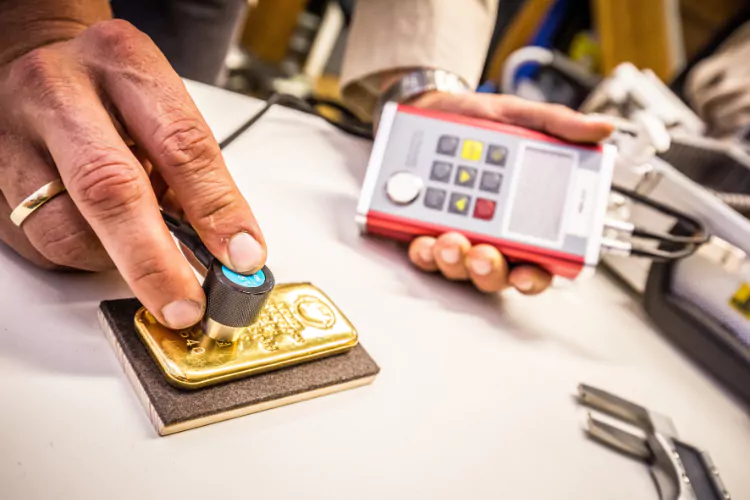
Testing the authenticity of gold is essential before finalizing any purchase. As you navigate the market, keep in mind that scammers often use counterfeit gold products that look nearly identical to the real deal. These fakes might be made from cheaper metals and simply coated with gold, making them difficult to identify without the right tools.
You should always deal with reputable dealers, as this reduces the risk of encountering fake gold. But even then, it’s crucial you verify the authenticity yourself or through a trusted professional. Several methods can be used to test gold. Magnet testing is a quick way to check, since real gold isn’t magnetic. If the item attracts a magnet, you’re likely dealing with a counterfeit.
More reliable is the acid test, where a small drop of nitric acid is applied to the gold. Real gold won’t react, but fake items will show discoloration. For a non-destructive method, consider using an electronic gold tester, which can tell you the karat of the gold.
Ensuring Consistent Weighing
To ensure you’re getting the full value of gold, always verify the scale’s accuracy before any transaction. Scammers may tamper with scales to show less than what you actually have, tricking you into a loss. Ask the dealer if you can test the scale with a known weight first. If they hesitate or refuse, consider it a red flag.
When you’re at a shop, notice if the scale is certified. Most legitimate businesses will have their scales regularly checked and calibrated by the appropriate authorities. Look for a sticker or a tag that indicates the last time the scale was serviced. If you can’t see one, don’t shy away from asking about it.
If possible, bring your own scale. A small, portable digital scale can be a reliable backup to ensure you’re not being cheated. Compare the readings from both scales; discrepancies could indicate foul play.
Lastly, always ensure the scale zeroes out before any gold is placed on it. Even a tiny error can make a big difference in value. If you’re not comfortable with the weighing process, don’t hesitate to walk away. Trust your instincts—they’re often right.
Learning Market Gold Prices
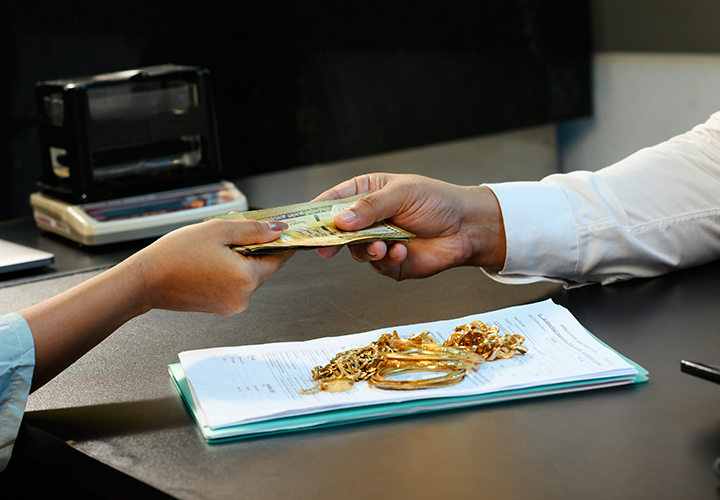
Understanding current market prices for gold is crucial before any transaction. You’ve got to know the real-time value of gold to ensure you’re not falling prey to scams. Globally, gold prices fluctuate daily based on market demand, geopolitical stability, and economic factors. It’s essential you keep an eye on these changes.
Start by checking reliable financial news websites, or apps that provide up-to-date gold prices. These platforms usually display prices per ounce or gram, and you can see trends over time. This insight isn’t just about knowing the current price; it’s about spotting patterns that could indicate future price movements.
Remember, gold prices listed online might differ slightly from local market prices due to additional costs like import duties and retailer margins. However, these online benchmarks give you a solid foundation for understanding what you should roughly be paying or receiving.
You’re not just protecting your investment but also your peace of mind. By being informed, you reduce the risk of being duped by anyone offering deals that sound too good to be true. Always stay updated and make decisions based on the most recent data available. This vigilance is your first defense against potential gold scams.
Getting Multiple Transaction Quotes
After learning about market gold prices, you’ll find it beneficial to get quotes from multiple sources before finalizing any transaction. This approach isn’t just about finding the best price; it’s a crucial step to safeguard against scams. When you’re offered a variety of quotes, you can compare them to see if any are suspiciously low or high, which often signals a potential scam.
Don’t hesitate to reach out to different types of buyers: reputable jewelry stores, pawnshops, and specialized gold traders. Each may offer different rates depending on their current stock and demand. Remember, while getting these quotes, you’re under no obligation to sell immediately. Take your time to review each offer thoroughly.
Moreover, engaging in conversations with multiple vendors enhances your understanding of the market. It equips you with knowledge about how gold is valued and helps you spot when something doesn’t seem right. It’s essential to remember that legitimate vendors expect and respect a buyer’s need to seek multiple quotes. Anyone pressuring you to make a quick decision should raise a red flag.
Preparing for Gold Appraisals
Before arranging a gold appraisal, you should familiarize yourself with the process to ensure you’re well-prepared and knowledgeable. Start by researching reputable appraisers in your area. It’s crucial you choose someone accredited and well-regarded to avoid falling victim to fake appraisal scams.
Next, understand the factors that influence gold’s value: weight, purity, and current market prices. You’ll be less likely to accept lowball offers if you know what your gold is truly worth. Don’t hesitate to ask prospective appraisers about their methods and criteria for evaluating gold. This transparency can give you insight into how thorough and fair their appraisal will be.
Also, prepare your gold items for appraisal. Clean them gently to ensure they look their best, but avoid using harsh chemicals that might damage the metal. Gather any certifications or receipts you have, as these can provide proof of purchase and authenticity, which are useful during the appraisal.
Frequently Asked Questions
How Can Climate Affect My Gold’s Appearance and Weight?
Climate won’t typically affect your gold’s appearance or weight. Gold is non-reactive and maintains its properties despite environmental changes. Always ensure its purity and weight with reliable testing, regardless of climate conditions.
What Legal Actions Can I Take if Scammed?
If you’re scammed, you can file a police report, consult a lawyer, and possibly take the case to court to seek compensation or punitive actions against the fraudster. Act quickly to gather evidence.
Are There Specific Scams Targeting Tourists in Sri Lanka?
Yes, tourists in Sri Lanka are often targeted with specific scams, including fake gem sales, overpriced taxi rides, and sham tour guides. Always verify credentials and agree on prices beforehand to avoid these pitfalls.
How Does Cultural Significance Impact Gold Scams in Sri Lanka?
Cultural significance can deepen the allure of gold, making you more susceptible to scams as the emotional value often overshadows prudent verification steps, leading to rushed decisions without proper authenticity checks.
Can Insurance Cover Losses From Gold Scams?
You should check your insurance policy’s terms, as coverage for losses due to scams isn’t typically included. It’s worth discussing additional coverage options with your insurer to protect against such risks.
